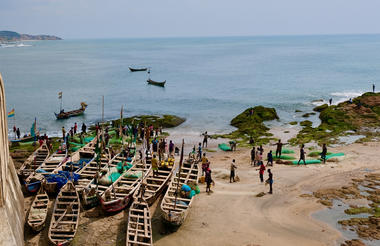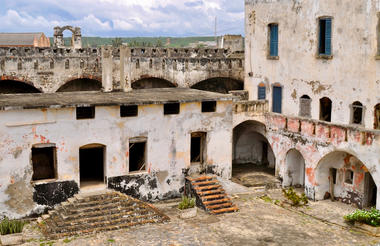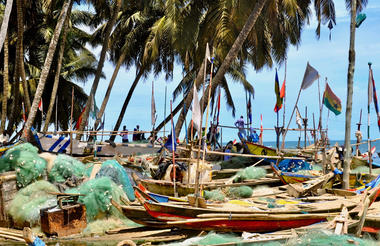Set along the magnificent Atlantic Coast in West Africa, the off-the-beaten-track country of Togo is known for its varied landscapes, pristine white-sand beaches, and diverse cultural heritage. Togo also offers a huge dose of tradition, with almost 40 different ethnic groups celebrating their rich culture and traditions with an array of festivals held throughout the year. Visitors can laze on the palm-fringed beaches of Lome and Aneho, view the amazing 17th-century mud huts of Koutammakou, and explore the country’s spectacular interior, known for its cocoa and coffee plantations and undulating savannah-covered hills traversed by a network of scenic hiking trails. Other highlights include visiting hilltop villages, browsing the fascinating fetish market, and soaking up Togo’s beautiful wilderness at the national parks of Fazao and Keran.
Situated on Africa’s west coast fringing the Gulf of Guinea, the charming city of Lome serves as the capital and largest city of Togo in West Africa. Once known as ‘The Pearl of West Africa’, today it is a sprawling city boasting palm-lined boulevards edged by colonial buildings, a variety of street-side eateries and vibrant markets. Highlights include: the Akodessewa Fetish Market, selling voodoo items; the National Museum housed in the Congressional Palace, displaying an array of traditional West African masks, musical instruments and jewellery; as well as the UNESCO-listed traditional mud-tower settlements of the Batammariba in the Koutammakou. Visitors can also look forward to soaking up Lome's rich cultural heritage featuring a mix of German, Portuguese and British influences, or relaxing at a beachside hotel after a long day of exploring the fascinating city streets.



Situated in West Africa, Benin is known for its pristine beaches, bountiful wildlife and rich history. Benin features stilted villages, numerous national parks and a dark past linked to the slave trade. This French-speaking West African nation is also known as the birthplace of the Voodoo religion. Visitors can explore French colonial architecture in the laid-back capital of Porto Novo; discover the bustling commercial hub of Cotonou, home to an impressive cathedral and the vibrant Dantokpa Market; and spot aardvarks and cheetahs at W National Park. Other popular attractions include: the Royal Palaces of Abomey, the Ouidah Museum of History and the eerie Door of No Return.
Cotonou is Benin’s biggest city and a key financial hub located on the country’s south coast – crowded, cosmopolitan and potently atmospheric. There is nowhere better to experience its essence than at Dantokpa Market – West Africa’s largest outdoor market, sprawling over 200 000 square metres. Vendors peddle a vast and eclectic assortment of spices, fresh produce, traditional African prints, religious ornaments, jewellery and more. The market’s sheer size is intimidating, not to mention the crowds and frenzy within, but its vibrant energy and excellent shopping opportunities make it well worth a visit. Other highlight attractions are the Cotonou Cathedral, with its candy-striped facade of wine-red and white tiles, the Fondation Zinsou, an art museum showcasing contemporary African art and cultural displays, and to the west of the city, lovely Obama Beach.



Located on the infamous strip of West Africa’s shoreline known as the Slave Coast, Ouidah was once the country’s human trafficking trade capital. During the 18th and 19th centuries, enslaved people were captured from all over the region and taken to the town to be shipped to other parts of the world. Today, this tragic episode is commemorated with a memorial trail lined with monuments, including the Tree of Forgetfulness and the Door of No Return. Benin is the birthplace of the original form of voodoo – known here as Vodun – and one of Ouidah’s most intriguing attractions is the Temple of Pythons, home to around 60 snakes held holy in this animist religion. Another must-see is the Sacred Forest – dotted with statues representing Vodun deities.



Situated in West Africa, Benin is known for its pristine beaches, bountiful wildlife and rich history. Benin features stilted villages, numerous national parks and a dark past linked to the slave trade. This French-speaking West African nation is also known as the birthplace of the Voodoo religion. Visitors can explore French colonial architecture in the laid-back capital of Porto Novo; discover the bustling commercial hub of Cotonou, home to an impressive cathedral and the vibrant Dantokpa Market; and spot aardvarks and cheetahs at W National Park. Other popular attractions include: the Royal Palaces of Abomey, the Ouidah Museum of History and the eerie Door of No Return.



As previously described


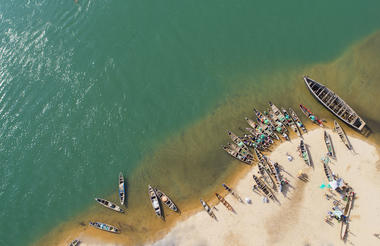
Set along the magnificent Atlantic Coast in West Africa, the off-the-beaten-track country of Togo is known for its varied landscapes, pristine white-sand beaches, and diverse cultural heritage. Togo also offers a huge dose of tradition, with almost 40 different ethnic groups celebrating their rich culture and traditions with an array of festivals held throughout the year. Visitors can laze on the palm-fringed beaches of Lome and Aneho, view the amazing 17th-century mud huts of Koutammakou, and explore the country’s spectacular interior, known for its cocoa and coffee plantations and undulating savannah-covered hills traversed by a network of scenic hiking trails. Other highlights include visiting hilltop villages, browsing the fascinating fetish market, and soaking up Togo’s beautiful wilderness at the national parks of Fazao and Keran.
Set along the magnificent Atlantic Coast in West Africa, the off-the-beaten-track country of Togo is known for its varied landscapes, pristine white-sand beaches, and diverse cultural heritage. Togo also offers a huge dose of tradition, with almost 40 different ethnic groups celebrating their rich culture and traditions with an array of festivals held throughout the year. Visitors can laze on the palm-fringed beaches of Lome and Aneho, view the amazing 17th-century mud huts of Koutammakou, and explore the country’s spectacular interior, known for its cocoa and coffee plantations and undulating savannah-covered hills traversed by a network of scenic hiking trails. Other highlights include visiting hilltop villages, browsing the fascinating fetish market, and soaking up Togo’s beautiful wilderness at the national parks of Fazao and Keran.



Sandwiched between the West African countries of Cote d'Ivoire and Togo in the Gulf of Guinea, Ghana is a friendly and largely safe country with locals who are usually eager to help first-time foreigners find their feet on African soil. This spectacularly scenic nation boasts an exquisite tropical coastline and exceptional national parks providing a haven for some unusual flora and fauna. The capital, Accra, is a thriving metropolis replete with bustling markets, luxury hotels and lively nightlife. Fill your itinerary with visits to gorgeous palm-fringed beaches, ancient forts, historical castles, and quaint fishing villages. Whether you are seeking a relaxing beach vacation or are keen to immerse yourself in the fascinating ancient cultures of this nation's diverse ethnic groups, Ghana offers a unique and compelling African experience.
Located at the confluence of three ancient trade routes, the vibrant, fast-growing city of Tamale rests in the heart of the northern region of Ghana in the kingdom of Dagbon. Tamale is a buzzing commercial hub of the region featuring an architectural mix of traditional mud houses, ornate mosques and more modern buildings including the new Tamale stadium. Visitors can immerse themselves in local culture by visiting the Kukuo Pottery Village or the Dakpema Palace where the Tamale king resides, sip the local non-alcoholic maize brew called Toose or ginger lamujee drink while watching the sunset, sample the traditional cuisine of grilled guinea fowl, waakye; or enjoy the buzzing northern Ghanaian music scene. Nature lovers can investigate the vast lush forest space and savannahs of the Mole National Park which boasts a myriad of wildlife including leopards, buffalo, elephants, hippos, and birds such as the white-backed vulture.



Sandwiched between the West African countries of Cote d'Ivoire and Togo in the Gulf of Guinea, Ghana is a friendly and largely safe country with locals who are usually eager to help first-time foreigners find their feet on African soil. This spectacularly scenic nation boasts an exquisite tropical coastline and exceptional national parks providing a haven for some unusual flora and fauna. The capital, Accra, is a thriving metropolis replete with bustling markets, luxury hotels and lively nightlife. Fill your itinerary with visits to gorgeous palm-fringed beaches, ancient forts, historical castles, and quaint fishing villages. Whether you are seeking a relaxing beach vacation or are keen to immerse yourself in the fascinating ancient cultures of this nation's diverse ethnic groups, Ghana offers a unique and compelling African experience.



Located in Southern Ghana's Ashanti Region, Kumasi is renowned for its rich heritage and is an important Ashanti cultural centre. This ancient capital of the Ashanti Kingdom features a fascinating blend of modern and historical treasures. Visitors can look forward to many interesting sites and enjoy a host of wonderful activities including the fascinating open-air Kejetia Market, offering locally made goods; the Jubilee Museum, which displays ceremonial garments and jewellery of the 20th-century Ashanti King; and learning more about Ashanti traditions at the popular National Cultural Centre.
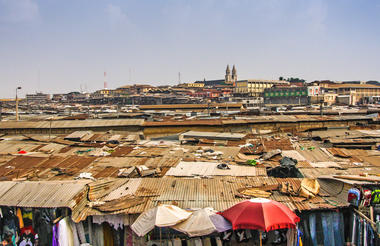
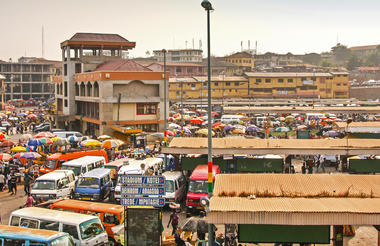
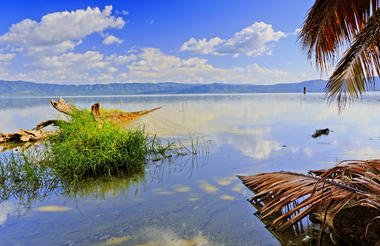
Situated just north of Ghana’s scenic Cape Coast, Anomabo is a small village dotting the seaside, characterised by palm-fringed streets and a beach that is definitely worth a wander. Delve into local history by visiting Fort Amsterdam located just 5 kilometres up the coast; sample traditional Ghanaian cuisine; and watch the local fishermen navigate the waves.
